Did you know that zucchini squash is one of the most versatile and widely consumed summer vegetables? It’s true! Whether you’re a seasoned chef or a beginner in the kitchen, zucchini squash offers endless possibilities for delicious and nutritious meals. Not only is it packed with health benefits, but it’s also easy to cook with and can be incorporated into a wide range of dishes.
How to Buy Zucchini Squash
When it comes to buying zucchini squash, selecting the right ones can make a noticeable difference in taste and texture. Here are some tips on how to choose the perfect zucchini for your next dish:
1. Size Matters
| Size | Description |
|---|---|
| Small to Medium | Opt for zucchini that are no longer than 7 inches. |
| Large | Avoid zucchini that are too big as they tend to have coarse, stringy flesh and large seeds. |
Choosing zucchini that are small to medium in size ensures a more tender and flavorful experience.
2. Appearance
When it comes to zucchini, appearance can tell you a lot about its quality. Here’s what to look for:
- Firmness: Select zucchini that feel firm and heavy for their size.
- Exterior: Look for zucchini with sound, glossy skins that are free of nicks, pits, bruises, or soft spots.
- Plumpness: Choose zucchini that are plump and not shriveled.
By considering these factors, you can ensure that you’re buying zucchini that is fresh and of high quality.
How to Store Zucchini Squash
After purchasing zucchini, store it in the crisper drawer of your refrigerator. It can be refrigerated for up to one week. Make sure to keep it in a plastic bag or wrap it in a paper towel to help retain its freshness.
Zucchini is a versatile vegetable that can be used in a variety of dishes. To keep it fresh for longer, proper storage is essential.
When you bring home fresh zucchini from the store or garden, follow these steps to ensure optimal storage:
- Wrap in a plastic bag: Place the zucchini in a plastic bag to prevent moisture loss and reduce the risk of spoilage.
- Store in the crisper drawer: Keep the zucchini in the crisper drawer of your refrigerator. This compartment is designed to maintain humidity levels, which helps preserve the freshness of the vegetable.
- Avoid washing the zucchini: Before storage, refrain from washing the zucchini. Washing can introduce moisture, which can accelerate spoilage.
- If necessary, use a paper towel: If you prefer not to use a plastic bag, you can also wrap the zucchini in a paper towel to absorb excess moisture.
Pro Tip: Be mindful of not overcrowding the crisper drawer. Proper air circulation is crucial to prevent humidity build-up and maintain the quality of the zucchini.
By following these simple storage guidelines, you can extend the shelf life of zucchini and enjoy its freshness for longer. Now you can confidently stock up on zucchini and have it readily available for your favorite recipes.
Zucchini Squash Recipes
If you’re looking for delicious recipes that feature zucchini squash, you’re in for a treat! Zucchini can be used in various dishes, ranging from sweet to savory. Here are some popular zucchini recipes that you can try:
Zucchini Bread
Indulge your sweet tooth with a moist and flavorful zucchini bread. This classic recipe combines the natural sweetness of zucchini with the rich aroma of spices like cinnamon and nutmeg. Enjoy it as a breakfast treat or a delightful afternoon snack.
Sauteed Zucchini
If you’re in need of a quick and easy side dish, sauteed zucchini is a great choice. Simply slice the zucchini and cook it in a skillet with a drizzle of olive oil, garlic, and herbs. The result is a deliciously tender and flavorful vegetable dish.
Zucchini and Tomatoes
For a refreshing summer salad, combine zucchini and tomatoes with fresh herbs and a tangy vinaigrette. This colorful dish is not only visually appealing but also packed with vibrant flavors.
Zucchini Fritters
Crunchy on the outside and tender on the inside, zucchini fritters are a crowd-pleasing appetizer or snack. These savory patties are made with grated zucchini, breadcrumbs, eggs, and seasonings. Serve them with a creamy dipping sauce for an extra burst of flavor.
Zucchini Rice Casserole
For a hearty and comforting meal, try a zucchini rice casserole. This dish combines cooked rice, sauteed zucchini, onions, cheese, and aromatic herbs. Baked to perfection, it’s a satisfying dinner option that the whole family will love.
These zucchini recipes are just a taste of the many culinary possibilities that this versatile vegetable offers. Whether you’re in the mood for something sweet or savory, zucchini is a fantastic ingredient for creating delicious and nutritious meals. So, grab some zucchinis and let your culinary creativity soar!
Zucchini Squash Nutrition Facts
Zucchini squash is not only tasty but also nutritious. It is a low-calorie vegetable, with approximately 21 calories per 1-cup serving. It contains important vitamins such as vitamin A and C, along with minerals like potassium and magnesium. Zucchini is also rich in antioxidants, which help reduce inflammation and fight off free radicals in the body.
If you’re curious about the specific nutritional content of zucchini squash, take a look at the table below:
| Nutrient | Amount |
|---|---|
| Calories | 21 |
| Total Fat | 0.2g |
| Saturated Fat | 0g |
| Cholesterol | 0mg |
| Sodium | 2mg |
| Potassium | 512mg |
| Total Carbohydrate | 4g |
| Dietary Fiber | 1g |
| Sugars | 2g |
| Protein | 2g |
| Vitamin A | 435IU |
| Vitamin C | 28.6mg |
| Calcium | 32mg |
| Iron | 0.6mg |
Zucchini is a nutritional powerhouse, offering a range of vitamins, minerals, and antioxidants essential for overall well-being. With its low calorie count and high fiber content, it’s an excellent choice for those watching their weight or managing diabetes. The vitamins A and C in zucchini promote healthy skin and immune function, while potassium supports heart health and magnesium contributes to strong bones. The antioxidants in zucchini help combat oxidative stress and protect against chronic diseases. Incorporating zucchini into your diet is a delicious and nutritious way to enhance your overall health.
Growing Zucchini in Your Garden
If you’re interested in growing your own zucchini squash, it is relatively easy to do so. Zucchini plants thrive in warm weather and require well-drained soil and plenty of sunlight. They can be grown from seeds or transplants and need regular watering. It’s important to provide adequate space for zucchini plants to spread out and keep an eye out for pests such as squash bugs and powdery mildew.
Here are some key tips for successful zucchini gardening:
- Choose the right location: Find a sunny spot in your garden with well-drained soil. Zucchini plants need at least 6-8 hours of direct sunlight each day to grow and produce well.
- Prepare the soil: Before planting, enrich the soil with compost or well-rotted manure to improve its fertility and drainage. Zucchini plants prefer slightly acidic to neutral soil, with a pH of 6.0-7.0.
- Planting: Sow zucchini seeds directly in the ground after the danger of frost has passed or start indoors a few weeks earlier. Plant the seeds 1 inch deep and 2-3 feet apart to allow enough space for each plant to grow.
- Watering: Zucchini plants require regular watering to keep the soil consistently moist, especially during dry periods. Water deeply at the base of the plant, avoiding overhead irrigation to reduce the risk of fungal diseases.
- Fertilizing: Apply a balanced fertilizer or compost to the soil before planting and again every 4-6 weeks throughout the growing season. This will provide the necessary nutrients for healthy plant growth and abundant fruit production.
- Weed control: Keep the area around the zucchini plants weed-free to reduce competition for nutrients and water. Mulching can help suppress weeds and conserve soil moisture.
- Pest and disease management: Inspect the plants regularly for signs of pests such as squash bugs and cucumber beetles. Use organic pest control methods, like hand-picking or spraying with insecticidal soap, to manage infestations. Powdery mildew is a common fungal disease that affects zucchini plants. To prevent it, provide good air circulation, avoid overhead watering, and remove infected leaves.
- Harvesting: Zucchini is typically ready for harvest within 50-60 days from planting. Harvest the fruits when they are 6-8 inches long and still tender. Use a sharp knife or pruners to cut the zucchini from the vine, leaving a small stem attached.
By following these tips, you’ll be well on your way to a successful zucchini garden. Enjoy the satisfaction of growing your own fresh and delicious zucchini!
Zucchini Squash and Your Health
Incorporating zucchini squash into your diet can have numerous health benefits. Its high antioxidant content helps reduce inflammation and fight off free radicals, which can contribute to chronic diseases. Zucchini is also beneficial for heart health due to its fiber, potassium, and magnesium content. It supports eye health with vitamins A, C, and carotenoids that protect against age-related eye diseases. Additionally, the soluble and insoluble fiber in zucchini promotes gut health and aids in digestion. The magnesium, manganese, and vitamin K found in zucchini also contribute to maintaining strong bones.
| Zucchini Health Benefits |
|---|
| Reduces inflammation |
| Fights off free radicals |
| Supports heart health |
| Promotes eye health |
| Aids in gut health |
| Maintains strong bones |
Zucchini and Heart Health
Zucchini plays a role in maintaining heart health due to its fiber, potassium, and magnesium content. Fiber helps lower cholesterol levels and reduce the risk of heart disease. Potassium helps control blood pressure, while magnesium supports proper heart rhythm.
Zucchini and Eye Health
Vitamins A, C, and carotenoids found in zucchini are beneficial for eye health. These nutrients help protect against age-related eye diseases, such as cataracts and macular degeneration.
Zucchini and Gut Health
Zucchini contains both soluble and insoluble fiber, which are essential for maintaining a healthy gut. Soluble fiber helps regulate blood sugar levels and promotes the growth of beneficial gut bacteria. Insoluble fiber adds bulk to the stool and aids in regular bowel movements.
Zucchini and Bone Health
Zucchini is a source of magnesium, manganese, and vitamin K, all of which contribute to maintaining strong bones. These nutrients play a role in bone formation, density, and overall bone health.
Zucchini Squash: A Versatile Ingredient
Zucchini squash is not just a delightful vegetable, but it also adds versatility to a wide range of dishes. Whether you’re looking to create a healthy pasta alternative, add moisture to baked goods, enhance the flavor and texture of salads, or whip up a quick and nutritious stir-fry, zucchini has got you covered.
Zucchini in Pasta Dishes
Zucchini can be spiralized into zoodles, creating a low-carb and gluten-free substitute for traditional pasta. Toss the zoodles with your favorite sauce, such as marinara or pesto, and enjoy a guilt-free and flavorful meal. It’s a great way to incorporate more vegetables into your diet while still satisfying your pasta cravings.
Zucchini in Baked Goods
Adding grated zucchini to your baked goods, such as breads and muffins, not only provides extra moisture but also adds a subtle sweetness. It’s a clever way to sneak in some veggies for picky eaters, and the zucchini blends seamlessly with the other ingredients, enhancing the overall taste and texture.
Zucchini in Salads
Incorporating zucchini into salads adds a refreshing and crunchy element. Thinly slice or julienne the zucchini and toss it with your favorite salad greens, like spinach or arugula. Combine it with other colorful vegetables, such as cherry tomatoes, bell peppers, and cucumbers, for a vibrant and nutritious salad.
Zucchini in Stir-Fries
Zucchini is a versatile addition to stir-fries, bringing both flavor and texture to the dish. Cut it into bite-sized pieces and stir-fry it with an assortment of vegetables and your choice of protein. The zucchini will soak up the flavors of the other ingredients, providing a delicious and nutritious component to your meal.
As you can see, zucchini is a fantastic ingredient that can be used in many creative ways. Whether you’re looking to lighten up your favorite pasta dishes, add a healthy twist to baked goods, create vibrant and refreshing salads, or whip up a quick stir-fry, zucchini never fails to impress. Experiment with different recipes and enjoy the versatility and deliciousness that zucchini brings to your meals.
Delicious Zucchini Squash Recipes to Try
If you’re looking for delicious and easy zucchini recipes to try, here are a few ideas:
- Roasted Zucchini: Slice zucchini, drizzle with olive oil, sprinkle with salt and pepper, and roast in the oven until tender and golden-brown.
- Udon with Seared Beef and Zucchini: Cook udon noodles, sear thinly sliced beef, and sauté zucchini. Toss everything together with a flavorful sauce for a satisfying Asian-inspired meal.
- Summer Squash Farro Bowl: Combine cooked farro with sautéed zucchini and other seasonal vegetables. Top with a tangy dressing and a sprinkle of herbs for a refreshing grain bowl.
- Zucchini Tzatziki Slaw: Shred zucchini and dress it with a creamy tzatziki sauce. Serve it as a refreshing side dish or a topping for sandwiches and wraps.
- Zucchini Pesto Pasta: Spiralize zucchini into noodles and toss them with a homemade pesto sauce. Add some cherry tomatoes and grated Parmesan for a light and flavorful pasta dish.
- Summer Squash with Scallions, Chile, and Parsley: Sauté zucchini and summer squash with scallions, chile peppers, and fresh parsley for a vibrant side dish with a kick of flavor.
- Zucchini and Mozzarella Frittata: Whip up a frittata with zucchini and melted mozzarella cheese. It’s a versatile dish that can be served for breakfast, brunch, or dinner.
- Spicy Summer Squash Stir-Fry: Stir-fry zucchini and other summer squash with your choice of protein and a spicy sauce for a quick and satisfying meal.
Nutritional Information
| Recipe | Calories | Protein (g) | Fat (g) | Carbs (g) |
|---|---|---|---|---|
| Roasted Zucchini | 87 | 3 | 6 | 7 |
| Udon with Seared Beef and Zucchini | 398 | 22 | 12 | 51 |
| Summer Squash Farro Bowl | 288 | 9 | 10 | 44 |
| Zucchini Tzatziki Slaw | 75 | 2 | 6 | 4 |
| Zucchini Pesto Pasta | 326 | 10 | 18 | 35 |
| Summer Squash with Scallions, Chile, and Parsley | 103 | 5 | 4 | 13 |
| Zucchini and Mozzarella Frittata | 198 | 14 | 14 | 3 |
| Spicy Summer Squash Stir-Fry | 231 | 12 | 14 | 16 |
These recipes offer a variety of flavors and cooking methods to help you enjoy zucchini squash in creative and tasty ways. Whether you’re looking for a simple side dish or a hearty main course, these zucchini recipes are sure to satisfy.
How to Make Skillet Zucchini and Yellow Squash
Skillet zucchini and yellow squash is a simple and delicious summer side dish that can be prepared in just 10-15 minutes. It pairs well with any main dish and adds a burst of flavor to your meal. Follow these easy steps to make this mouthwatering recipe:
- Heat a skillet over medium heat and melt a combination of butter and olive oil.
- Add the diced zucchini and yellow squash to the skillet, spreading them out in an even layer.
- Sprinkle salt and pepper over the squash to season it to taste.
- Let the zucchini and squash cook for about 5-7 minutes, stirring occasionally, until they turn golden and become tender.
- Once the vegetables are cooked, remove the skillet from the heat.
- Transfer the skillet zucchini and yellow squash to a serving dish.
- Sprinkle freshly grated Parmesan cheese over the top for extra flavor.
This easy summer side dish is perfect for barbecues, picnics, or any occasion where you want to showcase the vibrant flavors of zucchini and yellow squash. It adds a refreshing touch to your meal and is sure to impress your guests.
Try this skillet zucchini and yellow squash recipe today and enjoy a quick, healthy, and delicious side dish that celebrates the flavors of summer. It’s a great way to make use of fresh zucchini and yellow squash from your garden or local farmer’s market. Bon appétit!
Conclusion
In conclusion, zucchini squash is a versatile and nutritious vegetable that offers numerous health benefits. Incorporating zucchini into your diet can support heart health, eye health, gut health, and bone health. This delicious and accessible ingredient can be enjoyed in a variety of recipes, from breads and casseroles to salads and stir-fries.
With its low calorie content and high vitamin and mineral content, zucchini is a great addition to any meal. It can be grown in your garden or easily purchased from the store. Take advantage of the tasty and healthy benefits of zucchini squash by trying out some of the suggested recipes, such as roasted zucchini, zucchini tzatziki slaw, or zucchini and mozzarella frittata.
Whether you’re looking for a quick weeknight side dish or a flavorful addition to your summer gatherings, zucchini squash is a fantastic choice. So go ahead, get creative in the kitchen, and enjoy the versatility and goodness that zucchini has to offer!

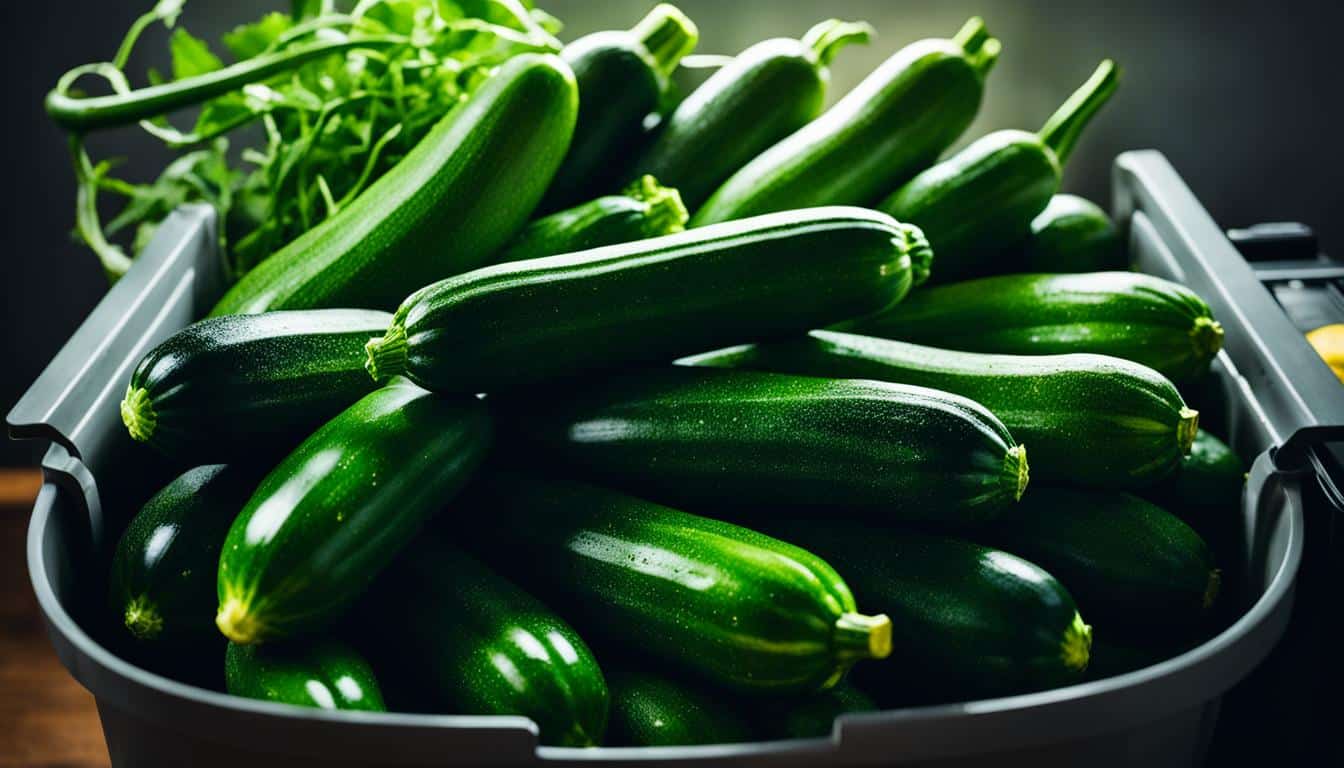
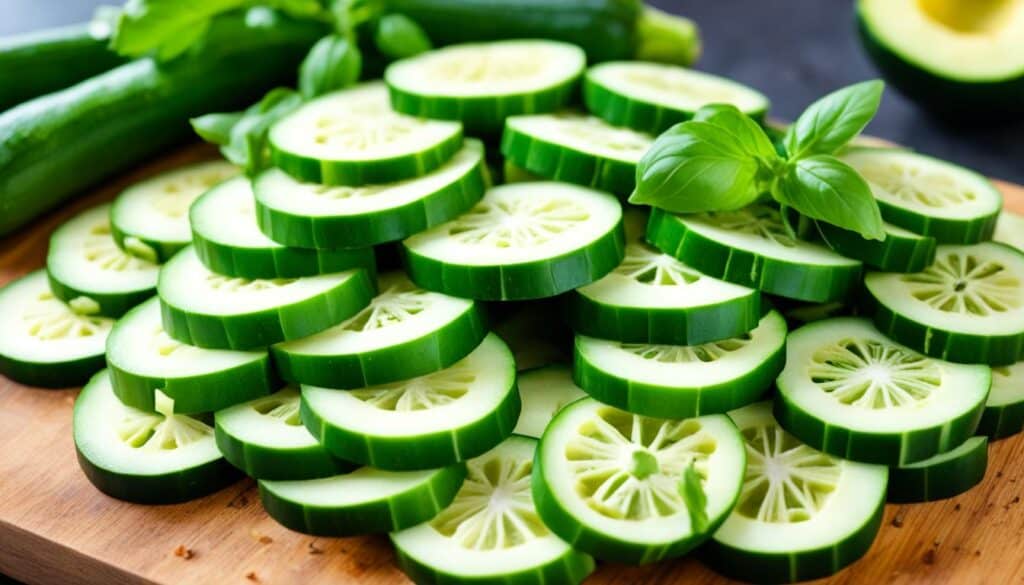
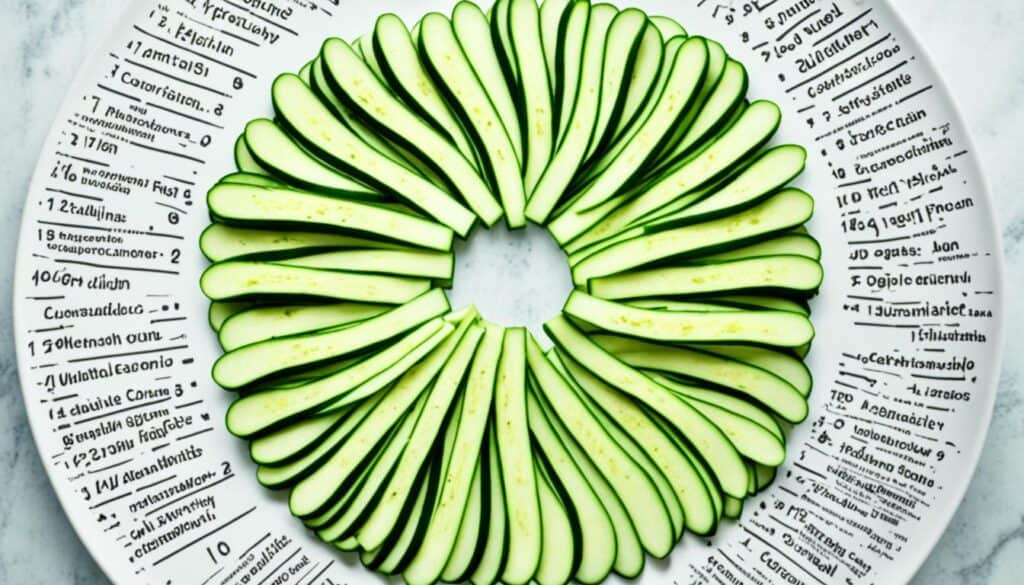
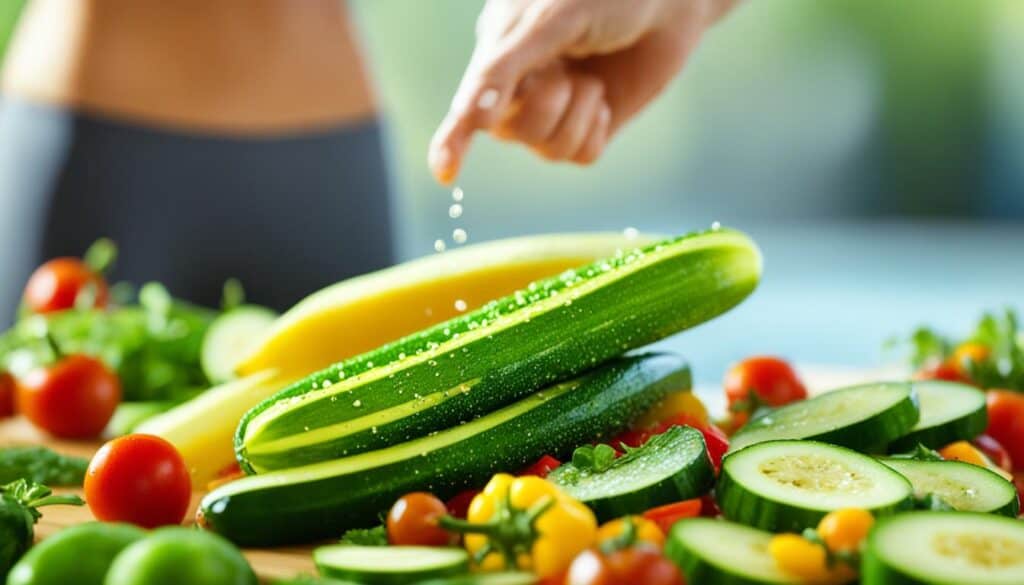
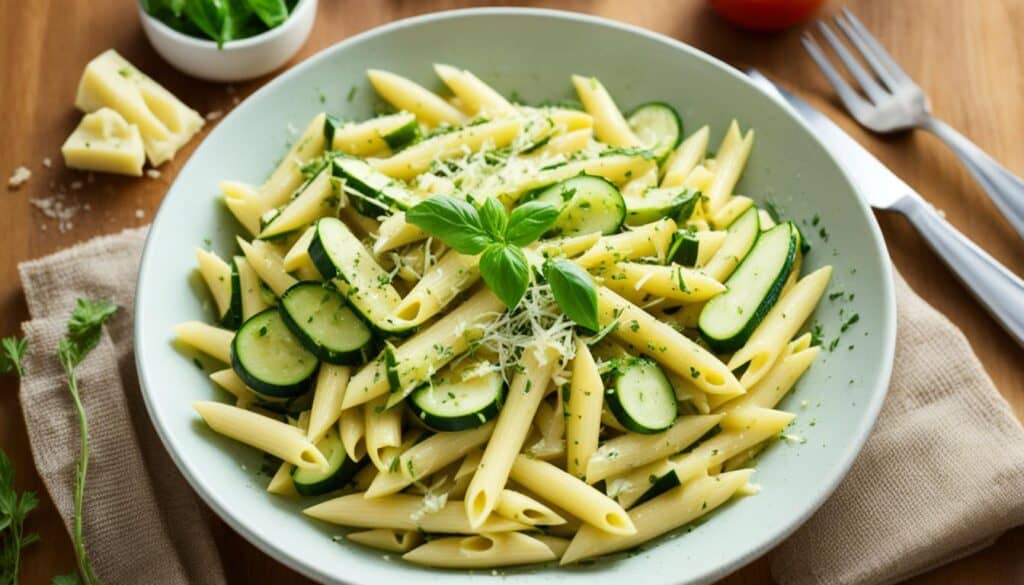
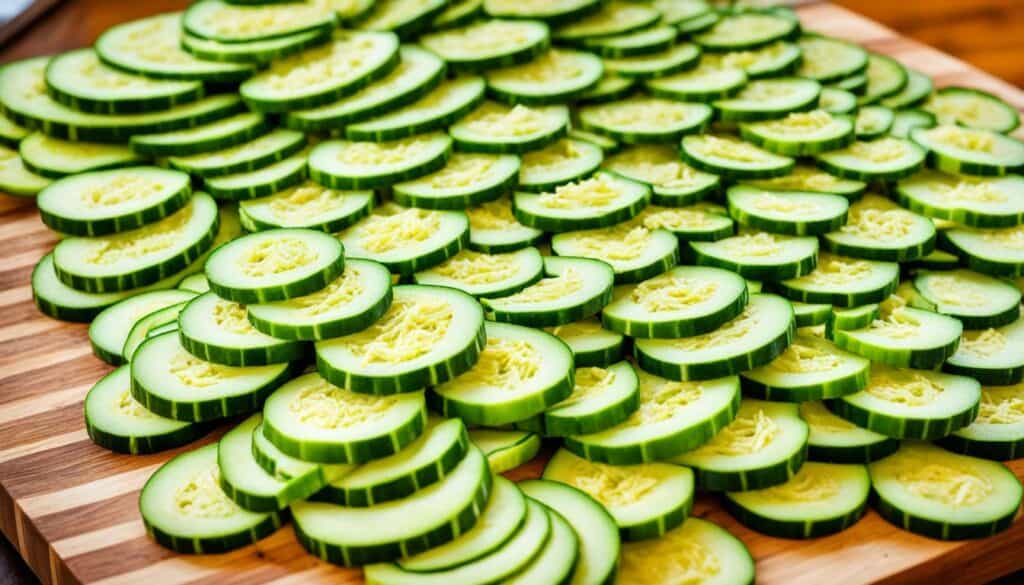



Leave a Reply